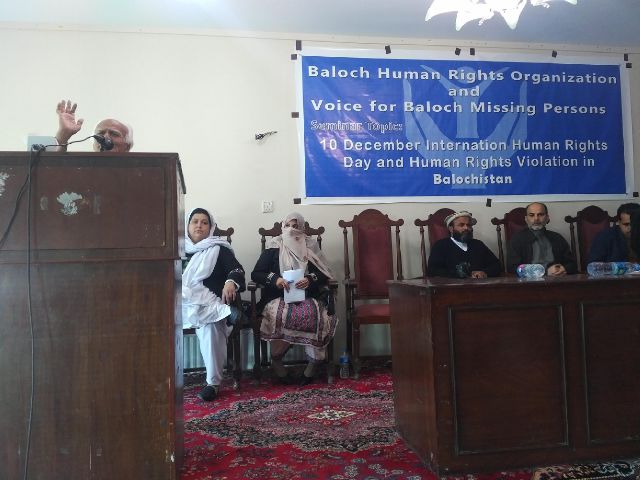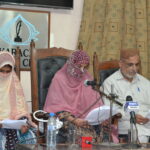Baloch Human Rights Organization and Voice for Baloch Missing Persons held a seminar on human rights violation in Balochistan on the occasion of International Day of Human Rights, in Quetta Press Club. The seminar was presided by Bibi Gul Baloch, Chairperson of Baloch Human Rights Organization. Different political p arties of Balochistan, journalists, student organizations and human rights activists participated in the seminar, among which Mussa Baloch from BNP, Secretary General of Jamaat Islam Hidayatullah Baloch, Sabira Islam from National Party, Ibrahim Kassi from ANP, Agha Ashraf Dilsoz, Voice for Baloch Missing Person’s Chairman Nasrullah Baloch, National Party’s organizer Dr. Abdul Hai Baloch and BHRO’s Chairperson Bibi Gul Baloch expressed their views in their speeches.
arties of Balochistan, journalists, student organizations and human rights activists participated in the seminar, among which Mussa Baloch from BNP, Secretary General of Jamaat Islam Hidayatullah Baloch, Sabira Islam from National Party, Ibrahim Kassi from ANP, Agha Ashraf Dilsoz, Voice for Baloch Missing Person’s Chairman Nasrullah Baloch, National Party’s organizer Dr. Abdul Hai Baloch and BHRO’s Chairperson Bibi Gul Baloch expressed their views in their speeches.
Mussa Baloch in his speech said that human rights are being violated in Balochistan for a long period of time, where in order to make CPEC successful and China happy, Baloch people are being massacred mercilessly. Instead of giving basic rights, the rights of Baloch people are being snatched.
Hidayatullah Baloch said that state forces, federal government and provincial government are equally involved in the violation of human rights in Balochistan and above all, due to differences among Balochs and Baloc

h tribes, human rights violators are gaining indefinite power.
Nasrullah Baloch declared silence of civilized world a criminal act on human rights violations and said that international organizations are not ready to listen to the voices of Baloch people. He invited other organizations to play vital role in raising their voices against human rights violations and said that our unity is only way to get rid of this oppression otherwise we will become its victims one by one.
Bibi Gul Baloch said in her speech that Balochistan is the most underdeveloped region of Pakistan by all means. Despite of mineral resources and coastal wealth, according to State Bank of Pakistan’s recent report; 80% population is living under poverty line in Balochistan. According to estimates of independent sources; in Balochistan thousands of Baloch children die per year due to malnutrition while according to a report published in 2015; maternal death rate in Balochistan is 3000 per year. The state has withdrawn from his responsibility in providing basic facilities like health, education and residence. Most rural areas don’t have health facilities at all. More than 90% of the patient in Balochistan travel to Sindh for their treatments.

Bibi Gul said that Balochistan government’s representative in his statement said that 13575 people have been arrested from November 2015 to August 2016. She showed her concern regarding military operations on daily basis, kill and dump policy and extra judicially abduction in Balochistan. She further added that including Balochistan, human rights are also being violated in Khyber Pakhtunkhwa and Sindh and for which Baloch Human Rights Organization struggled and struggling in raising its voice for all without any discrimination of race and color. She said that we need to struggle more effectively in order to get justice from international institution.
Sabira Islam, Doctor Abdul Hai, Ibrahim Kassi and Agha Ashraf Dilsoz also share their views in their speech in the seminar.
Baloch Human Rights Organization

